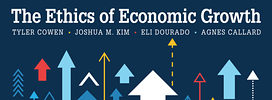Lead Essay
Tyler Cowen looks at the place of economic growth in philosophy and public policy. He finds it’s an underexamined subject. But if we really can make small, sustainable improvements to long-term economic growth, these seemingly trivial changes will prove in the long term to be among the most important choices we make today. Cowen therefore argues for giving greater weight to the longer term.
Response Essays
Joshua M. Kim argues for public education and a higher minimum wage, challenging the advocates of economic growth to make the case against them. Although Kim agrees that economic growth matters, he is skeptical that providing social welfare today is liable to slow economic growth, and he calls on Cowen and others to justify this part of their argument.
Agnes Callard sees Tyler Cowen as engaged with the classic utilitarian argument for radical wealth redistribution: since spatial differences don’t have moral significance, and the marginal value of our wealth is much higher in the hands of someone crushed by poverty, we should relinquish what we have until that marginal difference disappears. She frames Cowen’s response to this argument in terms of two claims: the similarly arbitrary character of temporal differences, and the utilitarian value of economic growth. When we consider the welfare of future human beings, together with the power of economic growth to raise all boats, then this utilitarian argument becomes an argument for the status quo.
Economic growth is fundamental to human well-being, says Eli Dourado; why have ethicists neglected it? He answers that much philosophy was produced when economic growth was either nonexistent or difficult to notice. Even modern ethicists may need to take stock of the world around him, he suggests, and he closes by praising the beauty of economic growth.
The Conversation
Coming Up
Conversation through the end of the month.

